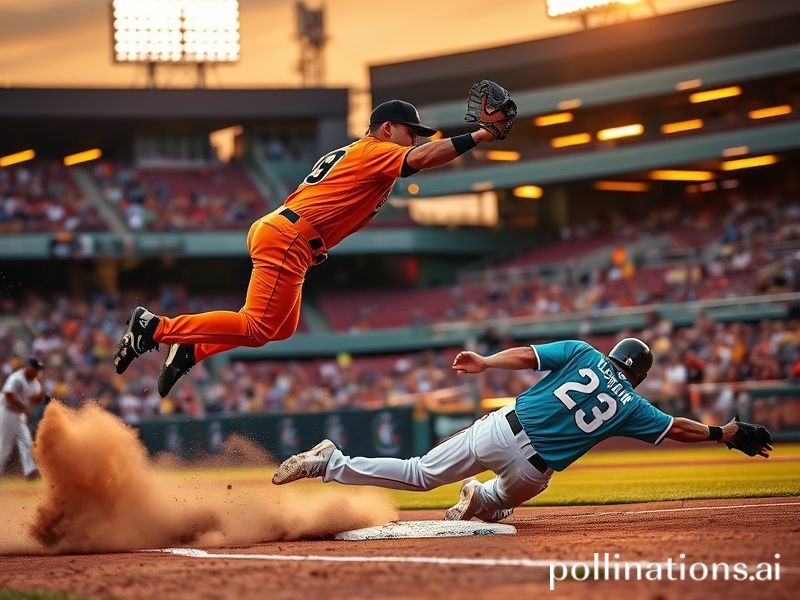Tigers vs Marlins: How a Meaningless Baseball Series Became the World’s Favorite Distraction
The last time the world cared this much about tigers and marlins in the same breath, a Bond villain was monologuing. Yet here we are, watching the Detroit Tigers and Miami Marlins wage a proxy war over the soul of professional baseball, while the rest of the planet politely pretends to follow the score. From Jakarta cafés streaming grainy feeds at 3 a.m. to Berlin pubs debating the existential value of a designated hitter, the series has become a Rorschach test for global anxieties—only the inkblots are shaped like overpriced ballpark nachos.
Let’s be clear: neither franchise is what geopoliticians would call a “hard power.” The Tigers have not invaded anyone since 1984, and the Marlins’ idea of territorial expansion is adding another pastel home-run sculpture to their taxpayer-funded terrarium. Still, the matchup has somehow become geopolitical comfort food. In Istanbul, where the lira’s doing interpretive dance, traders use the Tigers’ bullpen ERA as a volatility index. Seoul crypto-bros have minted NFTs of every Jazz Chisholm bat flip, presumably because nothing says “stable store of value” like a man flipping lumber at 97 mph. And in Lagos, where electricity is intermittent but hope springs eternal, radio hosts recite Miguel Cabrera’s aging slash line like scripture—proof that decline, too, can be heroic.
The symbolism is irresistible. Detroit, once the capital of twentieth-century optimism, now fields a roster that looks suspiciously like an IMF austerity package: cheap, young, and under team control until arbitration do them part. Miami, meanwhile, is what happens when venture capital discovers sunshine: a roster built like a SPAC—flashy, top-heavy, and liable to implode before the postseason audit. One city clings to rust-belt nostalgia; the other sells crypto tickets on the blockchain. Pick your poison, humanity.
International broadcasters have noticed. Japan’s NHK pairs the feed with melancholy shamisen solos, underscoring the inherent sadness of a slider that doesn’t slide. France 2 overlays existential subtitles: “L’homme qui swing et manque.” Even Al Jazeera cuts in between drone-strike updates, perhaps calculating that viewers prefer their tragedies nine innings at a time. Ratings spike whenever a position player is forced to pitch—nothing unites a fractured world like watching a backup catcher throw 48 mph lollipops to millionaires.
Meanwhile, the United Nations remains silent, which is how you know it’s serious. Secretary-General Guterres is reportedly waiting for Rob Manfred to declare a Climate Mercy Rule before issuing a statement. Rumor has it the Swiss are drafting a treaty limiting the number of mound visits to five per game, after which both sides must submit to binding arbitration in The Hague. The Chinese delegation has already vetoed it, insisting on unlimited pickoff throws in the name of national sovereignty.
Back in the stands, the human comedy plays out in miniature. A British tourist in a bespoke Savile Row jersey asks why the Marlins mascot is a vaguely menacing fish wearing sunglasses, and an Oakland transplant explains, “Same reason our economy runs on student debt and pumpkin spice—focus groups, mate.” A Venezuelan family cheers Tigers rookie Kerry Carpenter, whose surname evokes both Protestant work ethic and the looming housing crisis. Everyone sings “Take Me Out to the Ball Game” in their respective accents, united in the delusion that peanuts and Cracker Jack still cost less than a mortgage payment.
When the final out is recorded—usually on a 100-mph fastball that looks suspiciously like the last 100-mph fastball—the planet exhales. There is no parade, no geopolitical realignment, no sudden outbreak of world peace. Just another box score to scroll past on the way to doomscrolling. Yet somewhere in Nairobi, a kid who’s never seen grass that green is practicing a Miguel Cabrera leg kick in flip-flops, and in Warsaw, a bartender chalks “Marlins +1.5” next to the nightly pierogi special.
Baseball, like capitalism, promises nothing and delivers just enough hope to keep the lights on. The Tigers and Marlins will meet again tomorrow, because that’s how calendars—and existential dread—work. And the world will watch, half-awake, half-invested, wholly aware that the final score matters less than the shared illusion that it matters at all. In that sense, we’re all extra innings now.







